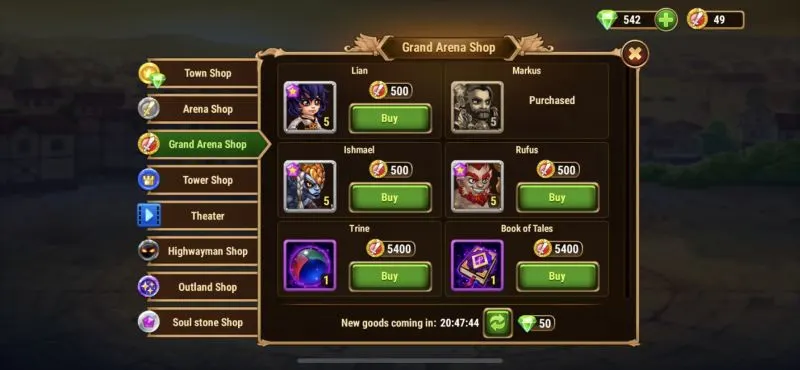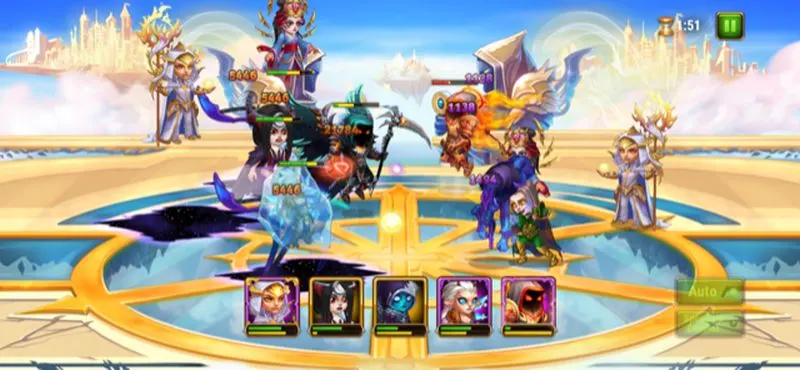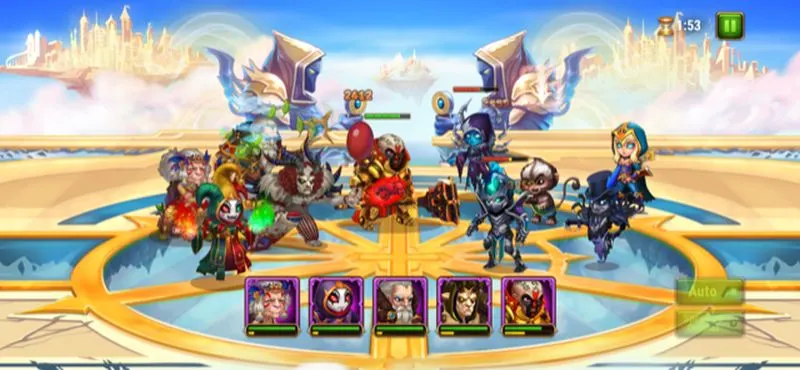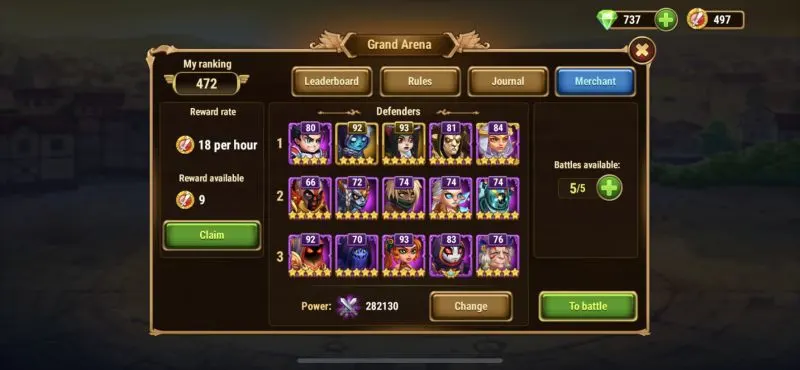Up to now, we still can’t keep our hands off Nexters’ Hero Wars, the action-adventure RPG from the same company behind Island Experiment and other titles. With its easy-to-learn game mechanics, many features and game modes, and the good balance between PvE and PvP modes, it’s no surprise why this game remains popular even if it’s been on the App Store and Play Store for quite a while. In addition to all that, the game still receives updates on a regular basis, including the Halloween update which brought the number of available Heroes up to 47 – who knows, maybe we’ll have an even four dozen before the year ends. You can also take part in special events that could help you earn more Soul Stones and unlock more Heroes! (Among other goodies you can win in these events, that is.)
Among all the modes in the game, the Grand Arena is quite the interesting one – not too many people play it compared to the Tower and the regular Arena, but as you’ll find out soon enough, there’s a reason behind this, and a pretty understandable one. But that doesn’t mean you should overlook this game mode, because you’re going to want to move up those rankings if you want to earn more Grand Arena Coins and unlock some of the game’s Heroes by purchasing enough Soul Stones. And that’s going to require some knowledge of creating the best possible teams for your Grand Arena units. Read on as we guide you through everything you need to learn about building the perfect Grand Arena team in Hero Wars.
1. The Grand Arena – An Overview
The Grand Arena is the last game mode every player can unlock in Hero Wars, as it becomes available once you reach team level 50. In terms of mechanics, it’s pretty similar to the regular Arena, as it features 5-on-5 battles against other players where you only need to choose the Heroes for the battle and everything else – meaning the activation of the special skills, pretty much – is handled by the AI. You are also allowed a maximum of five battles per day, unless you’re willing to spend some Emeralds to get some extra battles.
However, that’s where the main similarities end, as the Grand Arena, by its name alone, features more action – in here, you will be taking on rival players in best-of-three battles, choosing a total of 15 Heroes in three groups of five. Again, this applies to both your offensive unit, which is the one you’ll use when actually taking part in and witnessing the battles after challenging an opponent, as well as your defensive unit, which will take on the rival unit when you are challenged.
Another key difference between the regular Arena and the Grand Arena is the manner in which currency is earned. Whereas standard Arena battles earn you 20 Arena Coins per victory, Grand Arena Coins are earned passively on a per-hour basis and based on your ranking on the global leaderboard – that means if you’re satisfied with your ranking, you can go days without a Grand Arena battle, as you don’t have to fight in order to add to your Arena Coin totals.
For example, ranking between 501 to 700 earns you 14 Grand Arena Coins per hour, while a ranking between 701 to 1000 gets you 10 per hour. Make it all the way to the top of the rankings and you can earn 70 Grand Arena Coins per hour! Grand Arena Coins can be used to purchase various items at the shop of the same name, as well as Soul Stones for the following Heroes – Lian, Marcus, Rufus, and Ishmael.
Related: Hero Wars (Nexters) Farming Guide: How to Get More Gold, Emeralds, Soul Stones and Rare Equipment
In addition to the above similarities, you can improve your ranking in the Grand Arena by defeating someone of a higher ranking and taking their place, just like in the standard Arena. There is also a cooldown time of one minute in between battles, but since Grand Arena battles last longer due to the fact that they follow a best-of-three format, you probably won’t have to do any waiting before you can challenge another opponent. Likewise, your placement in the Grand Arena leaderboard will play a part in the quality and quantity of your daily Arena Rewards, much like your regular Arena ranking.
Speaking of the leaderboard, we should also mention that in the Grand Arena, higher-ranked players will have a “fog of war” advantage of sorts. Those ranked between 21 and 100 will have one team hidden from their opponent, while players ranked between 2 and 20 will have two teams hidden. And if you’re the top-ranked player overall, ALL three of your teams will be hidden, thus leaving everything up to chance for your opponent!
2. Make Sure You’ve Got At Least 15 3-4-Star Heroes Or Better, And Keep Them Leveled Up
While it’s a valid school of thought to focus more on quality than quantity when it comes to the Heroes you summon in Hero Wars, you’re going to need to have at least a third of the available Heroes at a high enough star rating and level in order to be competitive in the Grand Arena. That means you’ll need at least 15 of these Heroes at three or four stars and at a level consistent with your ranking on the leaderboard.
For example, if you’re ranked between 401 and 500, you’ll probably want to have at least 15 at four stars and at level 65 or higher, with at least five of those Heroes at level 80-90 and above. At that point, you should also have at least five Heroes at five stars, and you should also be making sure you’re balancing all three of your teams properly, as we’ll be discussing below!
Putting things another way, you’ll need to have a similar total power to most of the other players you’ll be matched against – you can’t expect to maintain your 450 ranking if you’ve got a combined power rating of 225,000 or less! (Doing the math, that’s 15 Heroes with an average power of 15,000.)
3. Keep Both Your Offensive And Defensive Units Balanced
Whether you’re choosing teams of Heroes to serve as your Defenders or as your offensive teams to challenge an opponent, balance is important. And this is something you may want to prepare for even before you reach level 50 and unlock the Grand Arena. It can be hard, after all, to play catch-up and spend precious resources on getting certain Heroes up to speed just because you had so much success early on with unbalanced teams of five in the Campaign, Arena, or in other modes.
Basically, you don’t want to spend all your coins and Emeralds and other resources on offensive-oriented Heroes – you shouldn’t neglect the Tanks that absorb damage up front even if they don’t offer much on the offensive end, the Healers that keep your top damage-dealers in the battle, and the various Support heroes who do the little things like cursing, stunning, or slowing down enemies. Maintain a balanced lineup for all your three teams, on top of what we advised you above, and you should be in good shape.
Each of the three teams ideally needs to have one Tank to soak up damage, two or three Marksmen, Mages, Warriors, or other characters with high Attack stats, and one or two supporting Heroes, usually one Healer and another who has a Control or Support role.
4. Which Heroes Should You Prioritize For The Grand Arena?
TANKS – Definitely, Astaroth and Galahad should be on top of your priority list in the Tank category. Not only do they get unlocked very early on in the game; they’re also very useful even in the later stages, with Astaroth serving a dual role on Support by protecting or resurrecting allies (including himself) and Galahad capable of doing a fair amount of damage for a Tank. For your third tank, Ziri is a good choice if you have her unlocked, thanks to her ability to burrow once her Health drops below 35 percent. Alternately, we would also recommend Luther, as it helps to have someone who could jump into the enemy’s backline and do damage to their Support Heroes – if leveled and starred up properly, he’s pretty useful against enemy teams that have Thea or Celeste in the backline!
DAMAGE-DEALERS – Regardless whether they’re Marksmen, Warriors, Mages, or whatnot, all Heroes capable of doing a great deal of damage against an opposing team are covered under this category. Let’s take a look at some of the better ones.
Ginger is a popular choice for many a Hero Wars player, and with good reason – her primary skill, Lead Storm, is a rapid-fire blast of bullets that hits all enemy Heroes, and she’s got some pretty good secondary and passive skills as well, while also boasting good durability for a non-Tank. Faceless may be a bit of a gamble, especially in Arena/Grand Arena where the battles are automatic, but the fact that he copies the primary skill of the last ally or enemy who used one makes him very effective if utilized properly. Cornelius can do a lot of damage with his primary skill, Heavy Wisdom, a monolith which hits the enemy with the highest Intelligence – this can be deadly against rival Healers.
Aside from those three, we also recommend Keira, provided you complement her with a Healer – she is one of the squishier characters in the game, though her lack of durability is mostly offset by her high-damage skills. Astrid and Lucas is technically a backline (pair of) character(s), but it’s hard to argue with how effective they are when the former unleashes the latter with her primary skill – that cat can sure do a number on enemy Tanks. Elmir, meanwhile, is the opposite – a front-line Hero who jumps back with his primary skill, but mainly frustrates enemies by cloning himself and creating up to four decoys that absorb AND deal out damage. (They cannot, however, regenerate health!)
Lastly, we would suggest the brother-sister duo of Lars and Krista, who work best if they’re on the same team, but while the former is more of a Support Hero, the latter is very effective if used as a standalone damage-dealer (particularly with Icy Vengeance as an area-of-effect skill) while also being comparatively sturdy. Ishmael is a good choice for those who want to gamble on critical hits, as that’s what his demonic form (via Awakening) does best. You can also prioritize Orion if you’re looking to target enemies with the highest health and take out the usually Support-dominated enemy backlines.
SUPPORT – All Heroes categorized as Healer, Support, or Control fall under this broader group, and at this point, we’ve gotten some of the best results in various modes with Celeste as our go-to Healer. When switching to Light Form via Two Fates, she can offer a quick pick-me-up to the ally with the lowest health, and when switching to Dark Form, she does the opposite by creating a Cursed Flame around the enemy unit, preventing any surrounding enemies from being healed for the next five seconds. But that doesn’t mean you should neglect Thea, who is the first Healer which Hero Wars players can unlock – her skills may not seem as impressive as Celeste’s, but her basic Solar Sanctuary skill, as stated, heals ALL allies.
Related: Hero Wars (Nexters) Character Skills Guide: A Complete Guide to All 45 Heroes
Jorgen has quietly become a favorite of ours, as mentioned in a previous guide, as his Control skills mainly have the effect of preventing enemies from gaining energy, thus preventing them from using their skills. He’s also quite durable, but not as much as Martha, who contributes next to nothing offensively, but can also help heal allies with the lowest health while also serving as an effective backline Tank.
Dorian’s main benefit comes through his main skill, Fountain of Blood, which helps allies recover health when they attack enemies he curses with the Mark of Blood, as well as his passive Initiation skill, which increases an ally’s Vampirism – if you notice an enemy staying much longer in battle than they should, that’s oftentimes a result of Initiation, which works even if Dorian’s already been killed. As for Nebula, we’ve yet to use her extensively in the different game modes, but she seems to do well for opposing human and AI-controlled teams alike as an all-around Support Hero – depending on the skill, she can deal AoE damage and sap energy, heal low-health allies, or target low-health enemies.
5. Assembling Your Defensive Unit – Don’t Spread The Talent Across
When forming your three defensive teams for the Grand Arena, the general rule here is to avoid setting things up in such a way that all three teams have similar total power ratings. Remember that these are best-of-three battles; you can take one loss and still defeat your opponent if you win the two other matchups. Spreading your talent across the board, while still effective against a much weaker opponent (which you’ll rarely see, thanks to Hero Wars’ generally fair matchmaking system), won’t do you any favors against most opponents whose team power is fairly close to yours. That’s because in general, players’ groups of Defenders usually consist of two teams that are considerably stronger than the third.
It doesn’t matter if you field the weakest links among your Defenders as your first, second, or third team. You can set things up in a way that you expect to lose the first matchup and win the next two, win the first, lose the second, and win the third, or win the first two and have the third team as a backup in case you and your opponent split matchups one and two. Any of those three strategies are better than spreading the wealth, though as we mentioned above, the principle of having a balanced party of Heroes applies as always.
6. Choosing Your Offensive Unit – Always Look At Your Opponent’s Teams
The same principle as above applies when you’re choosing your three teams of five and challenging an opponent – most of the time, you wouldn’t want to field three teams of similar total power, and most of the time, you’re better off deliberately losing one matchup and trying to win the other two. But choosing offensive teams comes with an additional wrinkle – unless you’ve got a really high ranking, meaning the top 100, you can view everyone on your opponent’s teams. You can see each Hero’s name, level, and each team’s total power, and you can use this information as a guide when choosing each team – or choosing specific Heroes for a certain team. So what’s next after you choose an opponent?
Also keep in mind that you can always refresh the list of possible opponents if none of the three appeal to you – maybe they’re too tough to defeat, maybe their ranking isn’t worth chasing, or maybe you want a challenge and don’t want the easy pickings. But once you’ve made your choice, you can then view the relevant information we mentioned above, and take it from there – for example, if you see your opponent’s first team is particularly weak, you can choose a team of five that is barely good enough to win, saving your better Heroes for the second or third team. Conversely, if your opponent’s first team is unbelievably strong, you can sacrifice your weakest Heroes, especially if you know you’ve got a chance of winning the next two matchups.
Choosing Heroes on offense also gives you many chances to fine-tune things by choosing specific Heroes, including the examples we discussed above, where you can select Luther as your tank in order to easily eliminate an enemy backline Healer like Thea or Celeste, or Cornelius if you’re trying to target those same Healers or other high-Intelligence characters without jumping into enemy territory. If the opposing team’s tank is Chabba, then perhaps it’s time to field Astrid and Lucas so that the former can unleash the latter on this particularly high-Health character. Or maybe the opposing team is loaded with low-offense Support and/or Tanks – you could select four high-offense Heroes and one Healer for better chances of winning.
At the end of the day, it will all depend on the Heroes you’ve summoned, and it may also depend on your personal preference. But the bottom line is that offensive strategy in the Grand Arena tends to be more intricate and requires more decisions than defensive strategy – still, many of these decisions will soon become second nature if you keep taking part in Grand Arena battles!





David Turner
Wednesday 18th of December 2019
I've tried so many different teams and still lose fast but lets start w step 1 picking an enemy, as i right in stating a rating that is above mine are the weaker ratings and those numbers below mine are stronger? is + / - 20 too much if i am 300 is 290 too strong? if my power is 100 k is 150 k too much? Better off to make 2 super strong teams ?